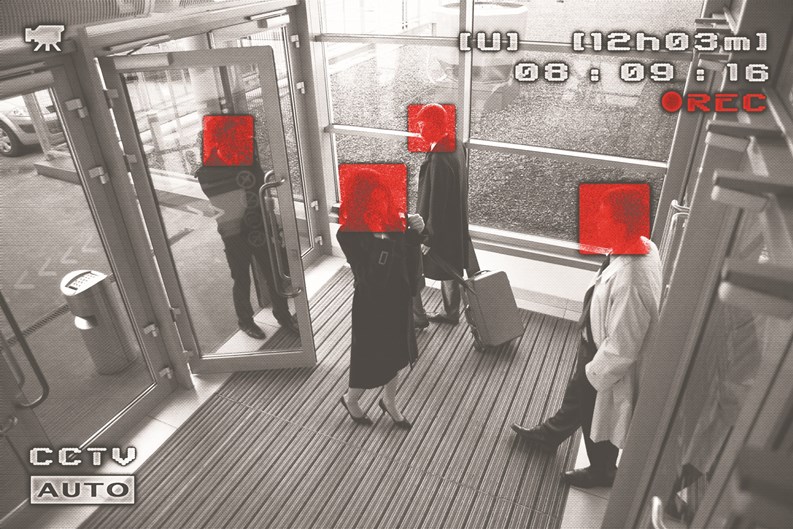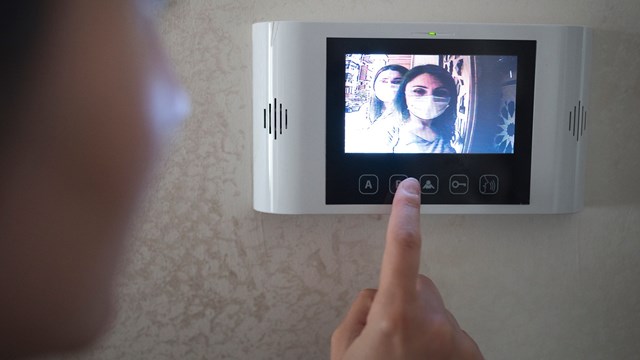Secure. The word has many meanings. According to Google definitions it can mean “to fix or attach something to something else. It can mean to protect against threats or make safe. Or it can mean to feel free from fear or anxiety.” Perhaps that feeling of security is the single most important thing we can to feel in our homes.
Security is a major issue for condominium communities today. The choice to buy into a condominium or other multifamily community overseen by an HOA rather than a private home may even be based on the desire of the purchaser to have peace of mind that security concerns are being addressed on a community-wide basis. According to an article that appeared in CONDO.ca online, “Security was the number-one concern among people looking to purchase a condominium.”
The state of surveillance and security has come a long way over the past few decades. Where security issues used to rest on the employment of security personnel and perimeter fencing, today’s security arrangements are more hi-tech and complex. Along with technology though, has come an uptick in both legislation and litigation—much of it arising at the intersection of legitimate security concerns with equally legitimate concerns about propriety and privacy.
Walking a High Wire
While board members of condominium associations and HOAs are as concerned with their security as the rest of their fellow condominium members, they have to balance the legal issues that govern both the successful security apparatus of the community and the potential liabilities of the association. According to Lisa A. Magill, an attorney Of counsel with Kaye Bender Rembaum, a law firm with offices in both Pompano Beach and Palm Beach Gardens, “Boards must refrain from referring to personnel as ‘security guards’ and stay away from any claims that the property is ‘secure.’ Guard gates do not necessarily function as security devices—they are more of a traffic control system and amenity. The association is not intended to be a ‘guarantor’ of security, even though there is a fiduciary duty to maintain the property in safe condition.” The distinction may seem nitpicky, but it is in fact a fair basis for litigation, so for the sake of the community and the board it is important.
Another interesting facet of the laws governing security in Sunshine State condos and HOAs pertains to when a board can act on its own to change or otherwise increase (or for that matter decrease) security arrangements. Magill explains that “The Florida Condominium Law generally prohibits ‘material alterations’ or ‘substantial additions’ to a property without membership approval. Security and many technological improvements can be considered alterations or improvements, triggering a membership vote. For example, in Warner Trust v. Azure at Bonita Bay Condominium Assn., Inc. the board installed two additional cameras in the building, one at the door from the parking deck to the garage and the other at the doors from the parking deck to the lobby. The building was originally constructed with three security cameras at major entry points.”
“In that building, owners and guests typically accessed the condominium by use of a key fob,” Magill continues. “The individually programmed fobs provided a record of who entered and exited the building. Contractors were required to register at the front desk so the association could verify licenses and the like. Complaints about unregistered contractors in the building prompted the board to install two more cameras. The case went to arbitration as required by Florida Condominium Law. The arbitrator did not (emphasis added -Ed.) agree that the installation of the additional cameras constituted necessary maintenance, and ordered the association to take a retroactive vote of the members.”
“It is really helpful if the governing documents—particularly the Declaration of Condominium—provide the board with some flexibility when it comes to upgrades, improvements and technological advances,” says Magill. “Otherwise, even a well-intentioned board’s efforts to boost security may be thwarted.”
Video, Yes—Audio, No—and Privacy Above All!
Robert Hudson, a shareholder and co-founder of the law firm of Hudson & Calleja, LLC, in Coral Gables, is a strong proponent of camera surveillance. “I recommend that my clients have surveillance cameras. Cameras are available today that can be monitored from a cell phone or a laptop. They can track all activity, including movement activated cameras. I tell my clients they cannot go wrong ever by having these cameras in all the common areas—even the hallways.”
That said, Hudson does point out that there are important privacy issues to be cognizant of. “The privacy of condo owners takes precedence over everything,” he says. “No camera can invade that privacy. Cameras can and should go in the lobby, the parking lot, the hallways, the common streets, and the more the better. But I reiterate; only the common areas.” Security never trumps privacy.
Interestingly though, while video recordings are recommended for condominium associations and HOAs as a preferred method of security and surveillance, audio recordings are strictly prohibited and frankly, illegal. Both Hudson and Magill explain that voice recordings come under a different set of statutes and are considered eavesdropping. Both counsel that even if you clearly announce by sign or notification that conversation is being recorded, audio recording is a legal minefield—one that condo associations and HOAs should definitely avoid. Furthermore, while these statutes are enacted at the state level, our research has shown this to be the case in several other areas, including Chicago and New York.
Complementary Technologies
As outlined above, today’s technological advances have made CCTV and key-fob security systems a major part of community security and surveillance. Key fobs and key cards are becoming more and more common. They are easily activated and deactivated, which makes them economical and handy—but ease of use doesn’t mean these items aren’t without their own caveats. “What boards should remember and condo owners remain vigilant of,” adds Magill, “is that unlike in short term rentals like a hotel, timeshare or an Airbnb arrangement, an association doesn’t have the authority to lock out guests and owners, even if they are an ‘illegal’ or unapproved tenant.”
Hudson also cautions boards relative to the use of key cards and key fobs saying, “You’ve got to keep track of how many cards are handed out and who has them. There has to be record keeping that shows the number of cards or fobs that are out, and provides a way to track them. What I’ve found in negligence cases is that often a perpetrator enters through a licensed and authorized key card, often obtained from someone authorized to have one. If there is no mechanism to track it, the perpetrator easily gets away.” That means that residents must understand that when a card or fob is lost or stolen, they must report it immediately.
Nothing Better Than the Real Thing
Perhaps the single issue that legal experts are most adamant about is the use of dummy cameras – fake cameras installed to give the appearance of robust security monitoring while theoretically avoiding the cost of installing and monitoring the real thing. “Dummy cameras are a bad idea that can only lead to increased liability exposure on the part of the association,” says Magill. “Having the cameras may create false expectations of security among residents who will not be happy about being duped after there is a loss, or even worse, a violent crime.” Hudson concurs. “It is very important not to create a false sense of security,” he says.
What is a board to do then to insure security for its members and to limit liability to the community? Magill suggests the following: “Board members must ensure that all buildings, improvements, landscaping and other property features are maintained appropriately. An association – along with its management company—lost a multi-million dollar case filed by the relatives of a child killed by a driver who claimed her sight was obstructed by overgrown hedges. A recent case filed against another association claims that gaps in the perimeter fence, broken locks and other neglected items made the premises accessible to criminal trespassers, and thus lead directly to the death of a resident.
So in light of those alarming possibilities, the legal pros offer some common sense tips for community leaders:
● Inspect and verify that all gates or other entrances to the community are operating properly, locked or secured;
● Verify that lighting sufficiently illuminates the property;
● Inspect landscaping and remove any overgrowth that blocks illumination from lighting or that interferes with sight lines; and
● Advise residents to keep cars/homes locked and garage doors closed.
Final Words
In addition to technology, Hudson is a strong proponent of incorporating a human component into your building or HOA’s security program. “I always recommend that my clients have a secured gate with card entry, but also a roving security guard in a golf cart or car surveying the entire complex in addition to the cameras which the guard should monitor.” While this may sound belt-and-suspenders redundant, Hudson says “The cost is insignificant relative to what you hope to protect.” One final piece of advice he gives to his clients has to do with how long condo associations and HOAs should maintain video records. Most video systems are designed to record over existing video every 30 days. “I urge my clients to keep their recordings for up to a year by burning them to disk,” Hudson advises. “If you notice an incident, burn it to a disk to preserve it immediately. Security staff should certainly be watching for that.”
Magill stresses the following as an important consideration for condo boards, HOAs and condo members in general. “Relying on cameras alone is not enough – especially when the cameras aren’t monitored on a real-time basis. While the cameras may serve as a deterrent…they won’t prevent a criminal from accessing the property or alert anyone to the possible dangerous condition at the time of the event. Having a video record is useful when seeking reimbursement of damages after someone crashes into the swing gate or vandalizes the property, but does little to keep the residents safe. I have heard the term ‘natural surveillance’ from time to time – and that refers to an awareness on the part of the residents.” Human eyes, ears, and common sense might be the most important factor after all.
A.J. Sidransky is a staff writer and reporter for The Western Florida Cooperator.






Leave a Comment